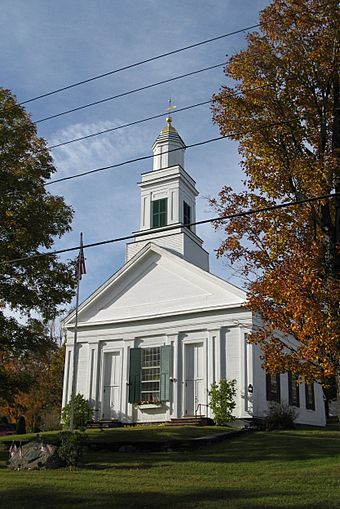Plainfield Center Historic District facts for kids
Quick facts for kids |
|
|
Plainfield Center Historic District
|
|

Plainfield Congregational Church
|
|
| Location | Portions of Church Ln., Broom, Central, Main, Pleasant & Union Sts., Plainfield, Massachusetts |
|---|---|
| Area | 730 acres (300 ha) |
| NRHP reference No. | 15000468 |
| Added to NRHP | July 27, 2015 |
The Plainfield Center Historic District is a special area in Plainfield, Massachusetts. It's like a time capsule showing how a small town center looked long ago. This district includes the town's oldest homes and important buildings. You can find the historic Plainfield Congregational Church here. The town hall and library are also part of this historic spot. This district was added to the National Register of Historic Places in 2015. This means it's officially recognized as an important historical place.
Discovering Plainfield Center
This historic district is found along Main Street. This road is also known as Massachusetts Route 116. The district stretches between Church Lane and Central Street. It covers about 730 acres (295 hectares).
A Look Back in Time
Plainfield was first settled by people in 1769. It officially became a town in 1785. The town center grew in one of the few flat areas. Most of the land around it has steep hills.
In its early days, Plainfield was a farming town. There were small mills for grinding grain and cutting wood. These mills mostly served the local people. In 1816, a water company was started. It built wooden pipes to bring water to the center. The first meeting house was built in 1792. This was the same year the Old Burying Ground was created.
What You'll See Today
The historic district's main part is along Main Street. It goes north to where Union and Central Streets meet. Here you will find the Hilltop Cemetery. This was the town's second cemetery.
The district also extends south along Central Street. This area has more homes spread out. It also has a lot of open rural land. Some of the town's oldest houses are here. Many of these homes are "Cape-style" buildings. They were built around the 1780s.
 | Audre Lorde |
 | John Berry Meachum |
 | Ferdinand Lee Barnett |



